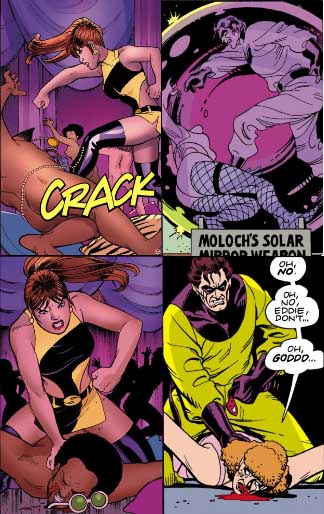
Before Watchmen was of course a moral and artistic travesty, amply documented in William Leung’s Who whitewashes the Watchmen review at Hooded Utilitarian, but what really struck me were the “homages” or “fun Easter eggs” as DC comics called them in their promotional material.
Even on their own merits these easter eggs are tone deaf, considering how much Alan Moore loathes and despises DC and Before Watchmen, so you must be pretty clueless as artist or writer working on it to think, “hey, I know, I’ll show my respect by putting in a little wink to the original series”. Worse though, when, as Darwyn Cooke and/or Amanda Connor did, the “homage” is to the rape scene where the original Silk Spectre was attacked by the Comedian in the first issue of Watchmen, here reimagined as her daughter beating up a pimp. That he’s a huge, fat black man (with all that implies, considering all those racial fears about what black men want to do to white women and how that worked out in real life) is just the racist icing on this particular sexist shitcake.
I do hope it was Darwyn Cooke who thought of this, because it’s exactly the sort of half-clever idea he tends to come up with and I think more highly of Amanda Connor, though you do wonder what she thought when drawing it. Cooke on the other hand is the epitome of the conservative fanboy turned professional, with no ideas of his own, spreading his bland nostalgia over everything he works on, in that sickening cutesy style of his.
Wearing smiley earrings and a cute pout on her face, Laurie is a badass chick delivering rough justice to a mean black dude. Like father, like daughter. It is blatantly obvious what effect Cooke and Conner are aiming for here. But the question they apparently didn’t have the wits to ask themselves is what on earth led them to think it’s okay to use Moore’s serious critique of misogynistic violence as a vehicle for their shallow indulgence in kick-ass theatrics. Cooke may do all the talking he wants about respecting female characters and Conner may present herself as a champion of her gender in a male-dominated industry (e.g. Zalben, “FanExpo” pars. 4-7); but to take the most well-known rape scene in mainstream comics and turn it into a celebration of the rapist’s progeny bespeaks gross insensitivity and moral blindness, not to mention being deeply offensive to the spirit and intelligence of the original Watchmen.
Then again, the whole idea of the Comedian as unseen father figure watching over Laurie goes so against the spirit of the original series that it’s not that surprising DC, Cooke and Connor see nothing wrong with paying homage to a rape.